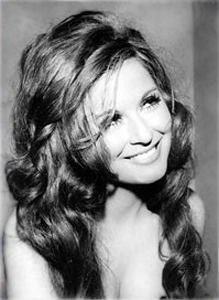
Soad Mohammad Kamal Hosny was an Egyptian actress. She was known as the "Cinderella of the Screen" and one of the most influential actresses in the Middle East and the Arab world.
A movie star is an actor who is famous for their starring, or leading, roles in movies. The term is used for performers who are marketable stars as they become popular household names and whose names are used to promote movies, for example in trailers and posters. The most prominent movie stars are known in the industry as bankable stars.
Ahmed Zaki Metwally Abdelrahman Badawi, usually known as Ahmed Zaki, was an Egyptian film actor. He was characterized by his talent, skill, and ability in impersonating. He was also famous for his on-screen intensity. Though he first appeared in a small role in a comedy play, he is widely regarded as one of the most talented male actors, especially in dramatic and tragic roles. Zaki worked in six films that have been listed in the Top 100 Egyptian films.
The Thief and the Dogs is one of the Egyptian author Naguib Mahfouz's most celebrated works. He further developed his theme of existentialism using stream-of-consciousness and surrealist techniques. It charts the life of Said Mahran, a thief recently released from jail and intent on having his vengeance on the people who put him there. The novel was published in 1961, and Said's despair reflects disappointment in revolution and new order in Egypt—as Said is not only a thief, but a kind of revolutionary anarchist.

Ahmed Hafez Mazhar was an Egyptian actor. He graduated from the military academy in 1938 and his colleagues included Gamal Abdel Nasser and Anwar Sadat.

The Egyptian film industry is today based mainly in Cairo, which is sometimes referred to as Hollywood on the Nile or Hollywood of the East, despite having its beginnings in the city of Alexandria in the early 20th century. A strong industry grew in Egypt with a high distribution rate among the Arab world, and Cairo produces around three-quarters of the Arab world's screen output. It has had a large effect on the African and Arab film industry since the early 20th century.

Salah El-Din Ahmed Mourad Zulfikar was an Egyptian actor and film producer. He started his career as a police officer in the Egyptian National Police, before becoming an actor in 1956. He is regarded as one of the most influential actors in the history of the Egyptian film industry. Zulfikar had notable roles in more than a hundred feature films in multiple genres during his 37-year career, mostly as the leading actor. He was one of the most dominant leading men in Egyptian cinema.
Chased by the Dogs or The Thief and the Dogs is a 1962 Egyptian film directed by Kamal El Sheikh, based on the 1961 novel The Thief and the Dogs by Naguib Mahfouz. It was entered into the 13th Berlin International Film Festival. The film was also selected as the Egyptian entry for the Best Foreign Language Film at the 35th Academy Awards, but was not accepted as a nominee.

Nahed Sherif, was an Egyptian actress who came to prominence in Egyptian and Lebanese films of the 1960s and 1970s.
People on the Top is a 1981 Egyptian drama film based on a story by Naguib Mahfouz and directed by Ali Badrakhan. It stars Soad Hosny, Nour El-Sherif and Ezzat El Alaili. The film is listed in the Top 100 Egyptian films.

Zubaida Ahmed Tharwat, was an Egyptian film, stage and television actress who was known as "the most beautiful eyes in classic Egyptian cinema".

Huda Sultan or Hoda Sultan (Egyptian Arabic: هـدى سلطان, Birth name: Bahiga Abdel'al , was an Egyptian actress and singer. She was also one of the most awarded actress for her roles, especially in musicals in the black and white films where she played secondary and leading roles. Sultan performed in hundreds of films in Egyptian cinema in a 56-year career.

Nadia Elgendi is an Egyptian actress and producer. She is often known in Egypt as "Negmet El gamaheer" because of the high commercial success of her movies in the 1990s. Through her still on-going 6-decades career, she has appeared in 61 movies and 7 TV shows. She is most recognized for her femme fatale roles and spy movies related to Egyptian-Israeli conflict and patriotic issues after 1952 revolution, such as El Gasousa Hekmat Fahmy (1994), Mohemma Fi Tel Aviv (1992). Also, she is known for various crime movies, ranging from vulgar drug dealer in Egyptian suburbs to a professional thief.
Ali Badrakhan is an Egyptian film director and screenwriter, the son of the director Ahmed Badrakhan. He worked as assistant to Fatin Abdel Wahab in Land of Hypocrisy in 1968, and with Youssef Chahine in the films Selection in 1971 and The Sparrow in 1974; his first movie was The Love That Was (1973) by Soad Hosny. Badrakhan collaborated with Naguib Mahfouz, Salah Jahin, and Ahmed Zaki.
Youssef Shaaban Shemis was an Egyptian actor.
The Family of Mr Shalash is an Egyptian comedy drama miniseries directed by Mohamed Nabih. Salah Zulfikar stars as Mr. Farouk Shalash. The series is based on a story written by Mohamed Nabih and Ahmed Awad. It was aired for the first time during Ramadan on 27 March 1990 on Egyptian television.
Sunset and Sunrise is 1970 Egyptian political film directed by Kamal El Sheikh. It stars Soad Hosny, Salah Zulfikar, Rushdy Abaza and Mahmoud El-Meliguy. The film is listed in the Top 100 films in the history of the Egyptian cinema.

A Date at the Tower is a 1962 Egyptian film written and directed by Ezz El-Dine Zulficar. It stars Salah Zulfikar, Soad Hosny and Fouad el-Mohandes.
Ana wa Banati is a 1961 Egyptian film starring Salah Zulfikar and Nahed Sherif. The film is written and directed by Hussein Helmy El-Mohandess. The film features an ensemble cast that includes Zaki Rostom, Amaal Farid, Fayza Ahmed and Zahret El-Ola.









